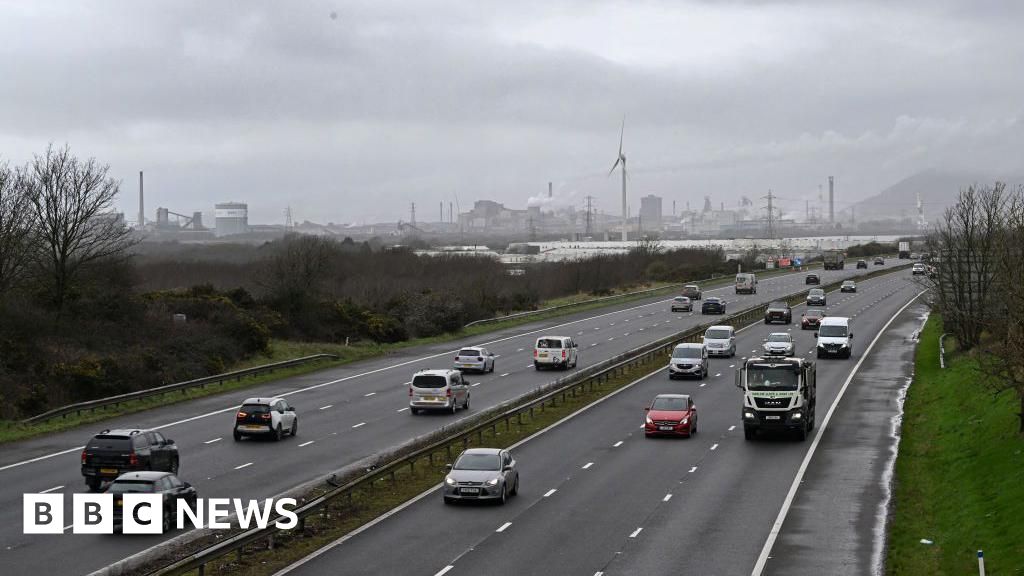Bussiness
Markets rise on US rate cut optimism; Tesla shares jump 10% after better-than-expected car sales – business live

Key events
Eurozone growth at three-month low – survey
In the eurozone, private sector growth eased to a three-month low, with activity in the service industries also at a three-month low, according to a closely-watched survey.
Demand for euro area goods and services declined for the first time since February.
The seasonally adjusted HCOB eurozone composite PMI output index, which pulls together the manufacturing and services readings, fell for the first time since October last year.
At 50.9 in June, the headline index posted above the 50 no-change mark for a fourth month in a row, signalling a sustained increase in euro area business activity. However, it was down from 52.2 in May, and signalled a rise in output that was the softest in three months.
Almost all of the eurozone nations with composite PMI data available recorded growth during June, but at a weaker rate than previously.
Spain was again the fastest-growing euro area economy, with output rising sharply. Moderate upturns were recorded in Germany and Ireland, while Italian growth eased to a four-month low. France was the outlier, as private sector business activity weakened for a second month running.
France’s service sector was an outlier, where the sharpest fall in new orders since January weighed on output. Some firms linked the softening to the uncertainty surrounding the general election, with the second round on 7 July. Business confidence also weakened, as did jobs growth.
Output prices – those charged by firms – rose slightly and at the slowest rate in more than three years.
The HCOB France services PMI business activity index posted below the 50 no change mark for the second month running. However, there was an improvement, with the index rising from 49.3 to 49.6.
In Italy, the service sector also expanded but slightly lost momentum in June. Service providers had the highest confidence in their outlook since early 2022. Overall new business picked up again, but at the softest pace for five months.
The headline index from the report, the HCOB Italy services PMI business activity Index fell to 53.7 in June, but remained above the 50 no change mark. That compared to 54.2 in May, and marked a sixth consecutive month that an increase in business activity has been recorded.
Germany also lost some momentum, with its services business activity index easing to 53.1 in June from 54.2 in May, marking a three-month low.
The upturns in new business and employment also slowed, while firms’ growth expectations for the coming year were at a five-month low.
The final readings for the closely watched PMI surveys are out.
In Spain, the private sector continued to expand at an above average pace in June, and firms hired more staff. Confidence in the future remained positive as firms looked to more stable economic and political environments in the months ahead.
The headline index from the HCOB Spain services PMI business activity index was at 56.8 in June versus May’s 13-month peak of 56.9. Any reading above 50 indicates expansion.
Thursday’s general election looks likely to be a historic pivot: one of those long-remembered moments when the established order at Westminster is swept away by what Jim Callaghan, the victim of one such shift in 1979, called a “sea change in politics”.
Yet as Guardian reporters fanned out across the UK during the campaign to spend time talking to voters and non-voters in 15 varied constituencies for the Path to power series, they found precious little hope that things will be different come 5 July.
Every constituency had its own particular concerns that bubbled up repeatedly in conversation: in Waveney Valley it was unwanted pylons, in Burnley it was the Gaza conflict and in Clacton it was immigration.
But several common threads run through much of the reporting, forming a dark narrative about the state of Britain and its people as Labour prepares to take power.
Everywhere reporters went, the infrastructure that makes up everyday life, from GP surgeries to libraries to roads, has been eroded by more than a decade of underinvestment.
In Chingford and Woodford Green, in north-east London, the parlous state of the pavements came up; people in North Cornwall are crying out for a bypass.
The NHS is raised again and again, in a litany of terrible stories, leavened with British stoicism. “I’m not knocking the NHS but it’s frustrating,” was how 26-year-old Katie Hayton, in Whitby, described her situation while awaiting a cornea transplant, for which she will have to travel 50 miles to York.
Money pouring into UK assets ahead of Labour victory, investors say
At the same time, City investors said a landslide victory for Keir Starmer in the general election tomorrow could hand Britain a stability premium in global markets, boosting the pound, shares and investment in the UK at a time of mounting political turmoil elsewhere.
In sharp contrast with Conservative party warnings over the dangers of a large Labour majority, analysts in the City of London said the prospect of a resounding mandate for Starmer’s party could secure Britain’s “safe haven” status among investors in an increasingly volatile world.
After failing to close the gap in opinion polls during the election campaign, Rishi Sunak made a last-ditch warning that a Starmer “supermajority” would “bankrupt people in every generation”.
However, City analysts said a Labour landslide could pave the way for global investment in Britain after years of political and economic uncertainty since the 2016 Brexit referendum under the Tories, which had clouded the prospects for international investors.
Highlighting mounting political instability on both sides of the Atlantic and the meltdown in financial markets triggered by Liz Truss’s mini-budget – when investors spoke of a “moron premium” for Britain – City experts said a clear outcome on Thursday could return Britain to a steadier footing.
Nuwan Goonetilleke, the head of shareholder assets at Phoenix Group, which manages more than £280bn in investments, said money was already pouring into London-listed assets in anticipation of a Labour victory.
The UK is really being seen not just as a safe haven, but the safest of havens – especially in Europe.
Wealthy sell UK assets amid fears of higher capital gains tax – report
Several rich individuals in the UK are reportedly selling shares, property and other assets days before an expected landslide for the Labour party, which they fear would raise capital gains tax.
Financial planners representing wealthy people told the Financial Times that some clients, from corporate chief executives to entrepreneurs, were offloading investments.
Shadow chancellor Rachel Reeves has said her party has no plans to raise CGT, but she has refused to rule out increasing the levy during a Labour government’s full term.
Several wealth managers said “lots of clients” had been in contact with questions about a possible CGT increase. For higher or additional-rate taxpayers, the tax is levied at 20% on gains made from selling assets, while property is taxed at up to 24%.
GSK buys full rights to flu and Covid jabs from CureVac
GSK has bought the full rights to develop, make and sell mRNA vaccines for flu and Covid-19 from Germany’s CureVac.
The UK’s second-biggest drugmaker is paying €400m upfront and up to an additional €1.05bn to the biotech firm, which was founded in Tübingen in southwest Germany in 2000. The two companies have restructured their existing collaboration into a new licensing agreement.
Since 2020, GSK and CureVac have worked together to develop mRNA vaccines for infectious diseases. They currently have vaccine candidates for seasonal influenza and Covid-19 in intermediate clinical trials (phase II) and avian influenza in phase I clinical development. The jabs are based on CureVac’s mRNA technology.
Tony Wood, GSK’s chief scientific officer, said:
We are excited about our flu/Covid-19 programmes and the opportunity to develop best-in-class mRNA vaccines to change the standard of care. With this new agreement, we will apply GSK’s capabilities, partnerships and intellectual property to CureVac’s technology, to deliver these promising vaccines at pace.
Alexander Zehnder, CureVac’s chief executive, said:
The collaboration with GSK has been instrumental in developing promising, late clinical-stage vaccine candidates, leveraging our proprietary mRNA platform. This new licensing agreement puts us in a strong financial position and enables us to focus on efforts in building a strong R&D pipeline.
Hawksmoor restaurant chain put up for sale
Jack Simpson
The UK restaurant chain Hawksmoor has been put up for sale in a deal that could value the restaurant at about £100m.
The popular chain of steak restaurants has hired investment bank Stephens to start looking for potential suitors for the business, which is currently looking to expand its overseas operation.
Hawksmoor, which was founded in 2006 by Will Beckett and Huw Gott in London, has now expanded to 13 locations, including three outside of the UK. Last week it opened its first restaurant in Chicago, while also owning restaurants in Dublin and New York.
Graphite Capital has owned a 51% stake in the chain since 2013 after it paid £35m to support a management buy out by both founders.
The investment process, which was first reported by the Financial Times, will see Beckett, who is the current chief executive, and Gott, who owns a minority stake, retain their stake after a deal is concluded.
Introduction: Markets rise on US rate cut optimism; Tesla shares jump 10% after better-than-expected car sales
Good morning, and welcome to our rolling coverage of business, the financial markets and the world economy.
Yesterday’s comments from US Federal Reserve chair Jerome Powell have spread optimism over interest rate cuts across markets. Japan’s Nikkei, Hong Kong’s Hang Seng and the Singapore and Taiwanese markets all rose more than 1%.
On Wall Street, the S&P 500 and the Nasdaq both closed at record highs.
Speaking at a European Central Bank forum in Sintra, Portgual, Powell noted the latest inflation readings from April and May “do suggest that we are getting back on a disinflationary path.”
However, he added: “We want to be more confident” before we decide on reducing policy. “We just want to understand that the levels that we’re seeing are a true reading on what is actually happening with underlying inflation.”
Minutes from the Fed’s June meeting are due later today and could offer clues on the central bank’s thinking on rates.
Ipek Ozkardeskaya, senior analyst at Swissquote Bank said:
Federal Reserve (Fed) President Jerome Powell said that the Fed has made ‘quite a bit of progress’ on inflation and investors didn’t need more to jump back on the back of a bull. The S&P 500 closed at a record high again, while Nasdaq 100 hit the 20,000 mark for the first time in history.
Shares in Tesla jumped 10.2% after the US electric carmaker reported a smaller-than-expected 5% drop in vehicle deliveries in the second quarter. It said price cuts and incentives helped stimulate demand.
The Agenda
-
9am BST: Eurozone HCOB Services and Composite PMIs final for June
-
9.30am BST: UK S&P Global Services and Composite PMIs final for June
-
11.30am BST: ECB policymaker Philip Lane speaks at forum in Sintra
-
1.30pm BST: US Trade for May, initial jobless claims
-
2.45pm BST: US S&P Global Composite PMI final for June
-
3pm BST: US ISM Services PMI for June
-
3.15pm BST: ECB president Christine Lagarde closing remarks at forum
-
7pm BST: US Federal Open Market Committee minutes of last meeting









